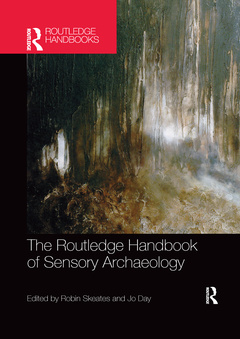The Routledge Handbook of Sensory Archaeology
Coordonnateurs : Skeates Robin, Day Jo

Edited by two pioneers in the field of sensory archaeology, this Handbook comprises a key point of reference for the ever-expanding field of sensory archaeology: one that surpasses previous books in this field, both in scope and critical intent.
This Handbook provides an extensive set of specially commissioned chapters, each of which summarizes and critically reflects on progress made in this dynamic field during the early years of the twenty-first century. The authors identify and discuss the key current concepts and debates of sensory archaeology, providing overviews and commentaries on its methods and its place in interdisciplinary sensual culture studies. Through a set of thematic studies, they explore diverse sensorial practices, contexts and materials, and offer a selection of archaeological case-studies from different parts of the world. In the light of this, the research methods now being brought into the service of sensory archaeology are re-examined.
Of interest to scholars, students and others with an interest in archaeology around the world, this book will be invaluable to archaeologists and is also of relevance to scholars working in disciplines contributing to sensory studies: aesthetics, anthropology, architecture, art history, communication studies, history (including history of science), geography, literary and cultural studies, material culture studies, museology, philosophy, psychology, and sociology.
1 Sensory archaeology: key concepts and debates; PART I: APPROACHES TO SENSORY ARCHAEOLOGY; 2 Digging up the sensorium: on the sensory revolution in archaeology; 3 Early theories of sense perception: Greek origins; 4 Doing sensory archaeology: the challenges; 5 How does it feel? Phenomenology, excavation and sensory experience: notes for a new ethnographic field practice; 6 The senses in museums: knowledge production, democratization and indigenization; PART II: SENSORIAL PRACTICES, contexts and materials; 7 Emotion and the senses in archaeology; 8 Movement, materials and intersubjectivity: insights from western Ireland; 9 Sensing death and experiencing mortuary ritual; 10 Environment and the senses; 11 Waterfalls and moving waters: the unnatural natural and flows of cosmic forces; 12 Darkness and light in the archaeological past: sensory perspectives; 13 The sensory archaeology of textiles; 14 Sensory perception and experience of glass; 15 Ceremonial architecture and public events; 16 Cities and urbanism; 17 Warfare and the senses: archaeologies of the senses and sensorial archaeologies of recent conflict; 18 The sensory experiences of food consumption; PART III: Archaeological Case-studies by period and region; 19 Stealing through the back door: sensory archaeology in the European Mesolithic; 20 Sensory archaeology in Scandinavia and Finland; 21 Sensory Mediterranean prehistory; 22 Sensory approaches to the Aegean Bronze Age; 23 The sensory world of Mesopotamia; 24 The sensory worlds of ancient Egypt; 25 Classical archaeology and the senses: a paradigmatic shift?; 26 Experimental archaeology and (re)-experiencing the senses of the medieval world; 27 Haptic vision: making surface sense of Islamic material culture; 28 Sensorial experiences in Mesoamerica: existing scholarship and possibilities; 29 Sensory archaeology in the Pueblo Southwest; 30 Sensory approaches to the woodland and Mississippian cultures of the Eastern Woodlands of North America; 31 Sensory archaeology in the Pacific; 32 Afterword: sensory archaeology¿a work in progress
Robin Skeates is a Professor at Durham University, UK. His research and publications explore a wide variety of themes within the overlapping fields of material, visual and sensual culture studies and museum and heritage studies. He is author of An Archaeology of the Senses: Prehistoric Malta, which combines his specialist interests in sensory archaeology and Central Mediterranean prehistory.
Jo Day is Assistant Professor in Greek Archaeology and Curator of the Classical Museum at University College Dublin, Republic of Ireland. She edited Making Senses of the Past: Toward a Sensory Archaeology and continues to research archaeology and the senses, especially relating to the Aegean Bronze Age. She also works on early ceramic technology and ancient foodways.
Date de parution : 06-2022
17.4x24.6 cm
Date de parution : 11-2019
17.4x24.6 cm
Thème de The Routledge Handbook of Sensory Archaeology :
Mots-clés :
Basketmaker III; Drape Coefficient; Pueblo III; Pottery Mound; Amenhotep III; Young Man; Ibn Al Haytham; Al Haytham; Long House; Sensory Affordances; Sensory Archaeologies; Wall Hangings; Van Keuren; Millennium Bce; Chaco Canyon; Aegean Bronze Age; Deer Park Farms; Solomon Islands; Ancient Pueblo; Early Medieval; Murchison Falls; Experimental Archaeology; Shell Rings; Mediterranean Prehistory; Passage Tombs



